#who were writing in the 1920s AND ALSO MORE RECENT???
Explore tagged Tumblr posts
Text
spike's horror rec list from the past ~year ish (i also have been doing. grad school. so its not a long list)
-The Salt Grows Heavy by Cassandra Khaw
-The Echo Wife by Sarah Gailey
-Just Like Home by Sarah Gailey
-How To Sell A Haunted House by Grady Hendrix
-The Design by China Mielville
-Don't Fear The Reaper by Stephen Graham Jones^1
^1 if you like Stephen Graham Jone's recent stuff, may i invite you to also read Growing Up Dead In Texas and/or Ledfeather ?
i also spent a long time this summer listening to short horror stories from the early 20th century and wow, okay, The King In Yellow (Robert Chambers) and The Willows (Algernon Blackwood) are. as good as everyone says. also have grown a fondness for clark ashton smith's bizarre and drippy necromancers.
#reading recs#please god please rec me nasty horror books god please#i need agonies or i wither#im about to start maevefly#also--im fucking mad about how difficult it is to find ahdiobooks of short stories by any of the PROLIFIC women horror writers#who were writing in the 1920s AND ALSO MORE RECENT???#IF YOU HAVE A BRAM STOKER AWARD YOUR PUBLISHER SHOULD BE MAKING YOUR SHORT FICTION COLLECTIONS SO ACCESSIBLE#MAKES ME MAD#I WANT TO READ THEM BUT ITS LIKE TRYING TO HUNT DOWN A DAMN SILVER DOLLAR
19 notes
·
View notes
Text
the appalachian murder ballad <3 one of the most interesting elements of americana and american folk, imo!
my wife recently gave me A Look when i had one playing in the car and she was like, "why do all of these old folk songs talk about killing people lmao" and i realized i wanted to Talk About It at length.
nerd shit under the cut, and it's long. y'all been warned
so, as y'all probably know, a lot of appalachian folk music grew its roots in scottish folk (and then was heavily influenced by Black folks once it arrived here, but that's a post for another time).
they existed, as most folk music does, to deliver a narrative--to pass on a story orally, especially in communities where literacy was not widespread. their whole purpose was to get the news out there about current events, and everyone loves a good murder mystery!
as an aside, i saw someone liken the murder ballad to a ye olde true crime podcast and tbh, yeah lol.
the "original" murder ballads started back across the pond as news stories printed on broadsheets and penned in such a way that it was easy to put to melody.
they were meant to be passed on and keep the people informed about the goings-on in town. i imagine that because these songs were left up to their original orators to get them going, this would be why we have sooo many variations of old folk songs.
naturally then, almost always, they were based on real events, either sung from an outside perspective, from the killer's perspective and in some cases, from the victim's. of course, like most things from days of yore, they reek of social dogshit. the particular flavor of dogshit of the OG murder ballad was misogyny.
so, the murder ballad came over when the english and scots-irish settlers did. in fact, a lot of the current murder ballads are still telling stories from centuries ago, and, as is the way of folk, getting rewritten and given new names and melodies and evolving into the modern recordings we hear today.
305 such scottish and english ballads were noted and collected into what is famously known as the Child Ballads collected by a professor named francis james child in the 19th century. they have been reshaped and covered and recorded a million and one times, as is the folk way.
while newer ones continued to largely fit the formula of retelling real events and murder trials (such as one of my favorite ones, little sadie, about a murderer getting chased through the carolinas to have justice handed down), they also evolved into sometimes fictional, (often unfortunately misogynistic) cautionary tales.
perhaps the most famous examples of these are omie wise and pretty polly where the woman's death almost feels justified as if it's her fault (big shocker).
but i digress. in this way, the evolution of the murder ballad came to serve a similar purpose as the spooky legends of appalachia did/do now.
(why do we have those urban legends and oral traditions warning yall out of the woods? to keep babies from gettin lost n dying in them. i know it's a fun tiktok trend rn to tell tale of spooky scary woods like there's really more haints out here than there are anywhere else, but that's a rant for another time too ain't it)
so, the aforementioned little sadie (also known as "bad lee brown" in some cases) was first recorded in the 1920s. i'm also plugging my favorite female-vocaist cover of it there because it's superior when a woman does it, sorry.
it is a pretty straightforward murder ballad in its content--in the original version, the guy kills a woman, a stranger or his girlfriend sometimes depending on who is covering it.
but instead of it being a cautionary 'be careful and don't get pregnant or it's your fault' tale like omie wise and pretty polly, the guy doesn't get away with it, and he's not portrayed as sympathetic like the murderer is in so many ballads.
a few decades after, women started saying fuck you and writing their own murder ballads.
in the 40s, the femme fatale trope was in full swing with women flipping the script and killing their male lovers for slights against them instead.
men began to enter the "find out" phase in these songs and paid up for being abusive partners. women regained their agency and humanity by actually giving themselves an active voice instead of just being essentially 'fridged in the ballads of old.
her majesty dolly parton even covered plenty of old ballads herself but then went on to write the bridge, telling the pregnant-woman-in-the-murder-ballad's side of things for once. love her.
as a listener, i realized that i personally prefer these modern covers of appalachian murder ballads sung by women-led acts like dolly and gillian welch and even the super-recent crooked still especially, because there is a sense of reclamation, subverting its roots by giving it a woman's voice instead.
meaning that, like a lot else from the problematic past, the appalachian murder ballad is something to be enjoyed with critical ears. violence against women is an evergreen issue, of course, and you're going to encounter a lot of that in this branch of historical music.
but with folk songs, and especially the murder ballad, being such a foundational element of appalachian history and culture and fitting squarely into the appalachian gothic, i still find them important and so, so interesting
i do feel it's worth mentioning that there are "tamer" ones. with traditional and modern murder ballads alike, some of them are just for "fun," like a murder mystery novel is enjoyable to read; not all have a message or retell a historical trial.
(for instance, i'd even argue ultra-modern, popular americana songs like hell's comin' with me is a contemporary americana murder ballad--being sung by a male vocalist and having evolved from being at the expense of a woman to instead being directed at a harmful and corrupt church. that kind of thing)
in short: it continues to evolve, and i continue to eat that shit up.
anyway, to leave off, lemme share with yall my personal favorite murder ballad which fits squarely into murder mystery/horror novel territory imo.
it's the 10th child ballad and was originally known as "the twa sisters." it's been covered to hell n back and named and renamed.
but! if you listen to any flavor of americana, chances are high you already know it; popular names are "the dreadful wind and rain" and sometimes just "wind and rain."
in it, a jealous older sister pushes her other sister into a river (or stream, or sea, depending on who's covering it) over a dumbass man. the little sister's body floats away and a fiddle maker come upon her and took parts of her body to make a fiddle of his own. the only song the new fiddle plays is the tale about how it came to be, and it is the same song you have been listening to until then.
how's that for genuinely spooky-scary appalachia, y'all?
#appalachia#appalachian murder ballads#murder ballads#appalachian music#appalachian culture#appalachian history#appalachian#appalachian folklore#appalachian gothic#tw violence against women#cw violence against women#cw murder#tw murder#folk music#folk#txt
3K notes
·
View notes
Text
PSA: RACISM, BIGOTRY, ENTITLEMENT IN HAZBIN HOTEL FANDOM
CONTENT WARNING: Inflammatory hate speech, White hate, political baiting, gaslighting, racism, death threats
The messages I’ve received and am addressing below contain upsetting and harmful language that has no place in any community. If these topics are distressing to you, please prioritize your well-being and feel free to stop reading here. Thank you for taking care of yourself.
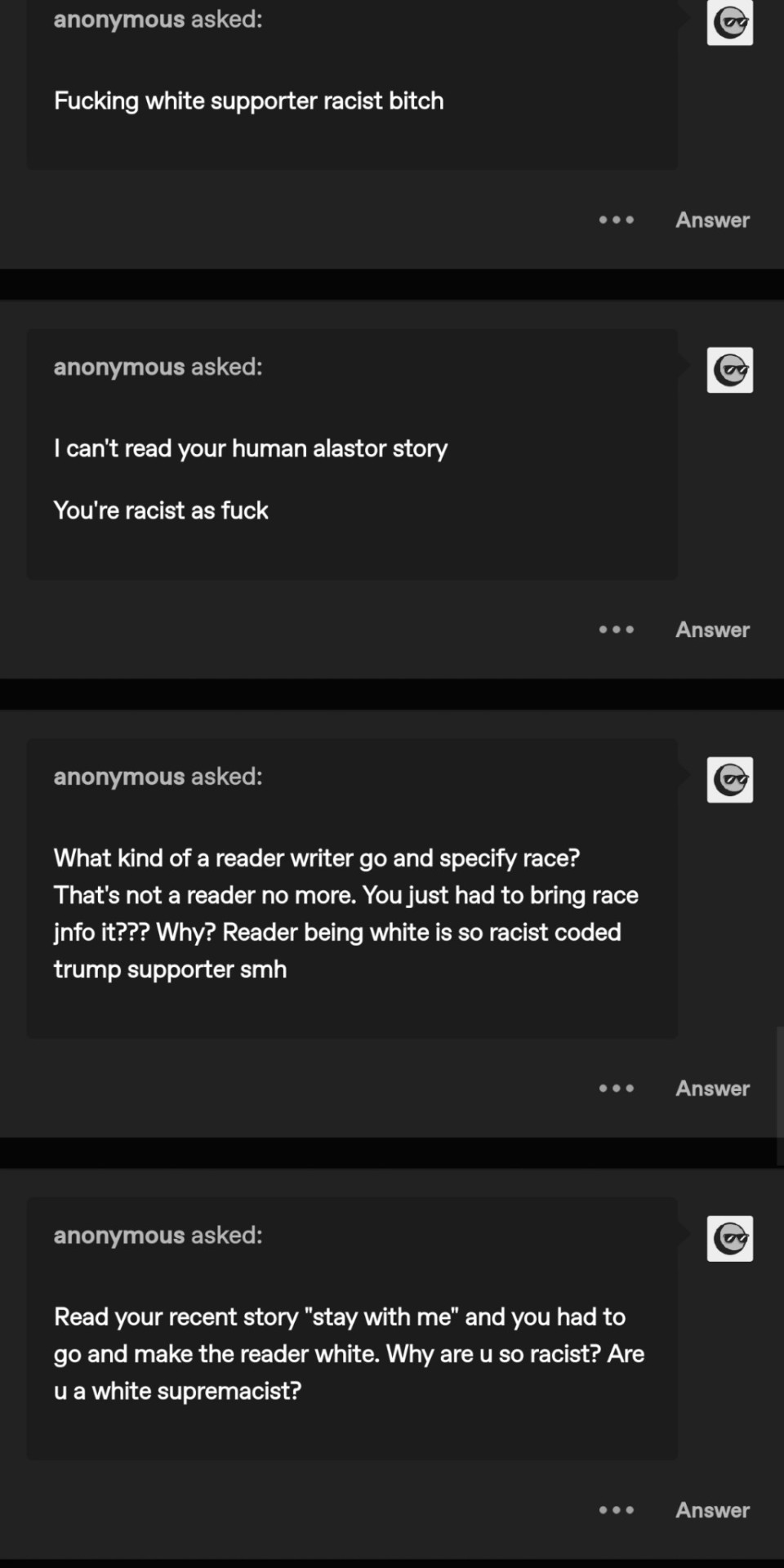
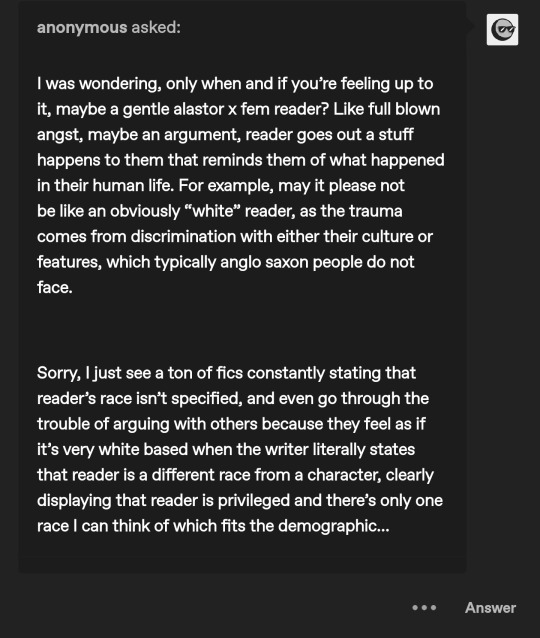
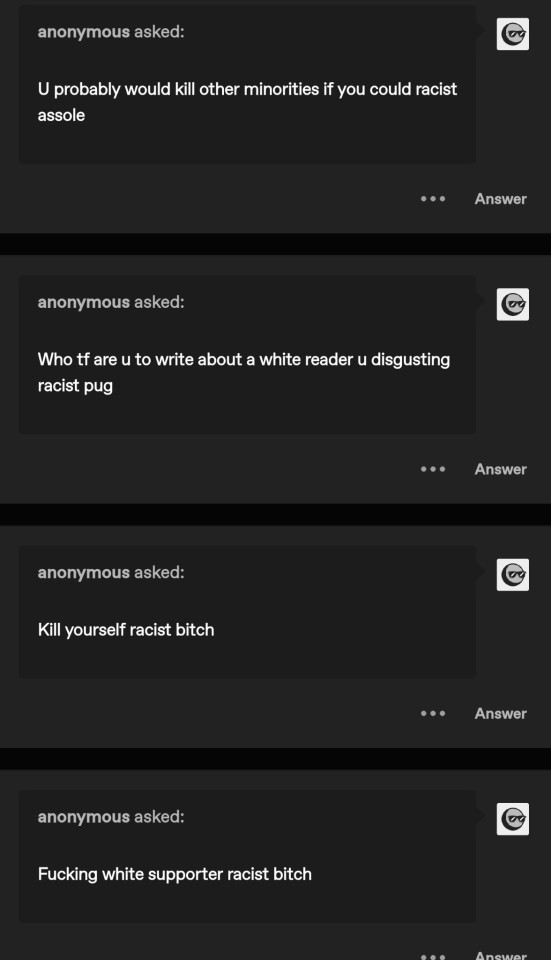

I never imagined I would find myself addressing this, but here we are. This post is regarding my recent story, Stay With Me, which has stirred up unexpected controversy due to my decision to imply the reader’s race as white. I want to clarify that this choice was made purely for plot purposes.
The story is set in 1920s Louisiana, a time and place where racial and class dynamics were deeply significant. This backdrop was essential to the narrative’s themes of tension and forbidden love, as it explores the societal barriers that would have made a relationship between Alastor and the reader virtually impossible. The decision to depict the reader as an upper-class white individual was not arbitrary—it was intentional, aimed at heightening the drama and emotional weight of their story.
I deeply value the Hazbin Hotel fandom and the x-reader community. Writing for this space has brought me immense joy, and I’ve formed wonderful connections with both readers and fellow writers. That’s why receiving such hateful and inflammatory messages has been incredibly disheartening. The accusations of racism, the vitriol, and the twisting of my creative choices into something they were never meant to be—this has shaken me more than I can express.
To the anonymous senders of these messages: I want to make it clear that my work comes from a place of love and passion. My intention has always been to tell compelling stories that explore complex emotions, societal norms, and the human condition—stories that resonate with readers on a deeper level. To reduce my work to a political agenda or an act of prejudice is deeply hurtful and entirely unfounded.
I want to echo sentiments shared by Kit (please check out her explanation here), another writer in the fandom, who also explored the racial and class dynamics between characters. Like them, I am fascinated by the tension and drama that arise from star-crossed love stories, particularly when societal laws and prejudices forbid such relationships. Writing the reader as white in this context wasn’t about excluding or favoring anyone—it was about creating an authentic narrative rooted in the realities of the era.
For those questioning why I made this choice, I ask: if you can suspend disbelief to fall in love with a cannibalistic, asexual deer demon, why is the reader’s race—chosen for specific plot reasons—the line you cannot cross? My goal as a writer is to craft stories that make sense within their own context. The entitlement to demand otherwise, or to impose personal prejudices onto my work, is unfair and unwarranted.
I hate that I’ve had to turn off anonymous asks. Some of the most heartfelt and hilarious messages I’ve received have come from anonymous users, and losing that connection with my readers pains me. But unfortunately, the actions of a loud, hateful minority have left me with no choice. I will not entertain further discourse on this matter after this post.
To those who have supported me, who have read my stories and shared kind words: thank you. Your encouragement is what keeps me going. Writing for this fandom has been a labor of love, and I pour my heart and soul into every piece I create—for free, might I add. It’s devastating to feel that love overshadowed by hostility.
I won’t let this stop me from creating, but I’d be lying if I said it hasn’t made me question my place here. To anyone who feels entitled to tear down what others create out of hatred or spite: I hope you take a moment to reflect on the harm your words can cause.
To my true supporters: I appreciate you more than words can express. Your kindness reminds me why I love writing in the first place. Thank you for standing by me.
#hazbin hotel#hazbin hotel fandom#alastor x reader#human alastor x reader#human alastor#alastor#hazbin hotel alastor#alastor x reader smut#hazbin hotel fanfiction#alastor hazbin hotel#alastor the radio demon#hazbin alastor x reader#alastor human#alastor hazbin hotel x reader#hazbinhotel#hazbin hotel alastor x you#hazbin alastor x you#alastor x you#alastor x oc#hazbin alastor#alastor hazbin x reader#alastor hazbin x you#alastor hazbin#human alastor x you#human alastor x oc
233 notes
·
View notes
Text
My alternate universe fantasy colonial Hong Kong is more authoritarian and just as racist but less homophobic than in real life, should I change that?
@floatyhands asked:
I’m a Hongkonger working on a magical alternate universe dystopia set in what is basically British colonial Hong Kong in the late 1920s. My main character is a young upper middle-class Eurasian bisexual man. I plan to keep the colony’s historical racial hierarchy in this universe, but I also want the fantasy quirks to mean that unlike in real life history, homosexuality was either recently decriminalized, or that the laws are barely enforced, because my boy deserves a break. Still, the institutions are quite homophobic, and this relative tolerance might not last. Meanwhile, due to other divergences (e.g. eldritch horrors, also the government’s even worse mishandling of the 1922 Seamen's Strike and the 1925 Canton-Hong Kong Strike), the colonial administration is a lot more authoritarian than it was in real history. This growing authoritarianism is not exclusive to the colony, and is part of a larger global trend in this universe. I realize these worldbuilding decisions above may whitewash colonialism, or come off as choosing to ignore one colonial oppression in favor of exaggerating another. Is there any advice as to how I can address this issue? (Maybe I could have my character get away by bribing the cops, though institutional corruption is more associated with the 1960s?) Thank you!
Historical Precedent for Imperialistic Gay Rights
There is a recently-published book about this topic that might actually interest you: Racism And The Making of Gay Rights by Laurie Marhoefer (note: I have yet to read it, it’s on my list). It essentially describes how the modern gay rights movement was built from colonialism and imperialism.
The book covers Magnus Hirschfeld, a German sexologist in the early 1900s, and (one of) his lover(s), Li Shiu Tong, who he met in British Shanghai. Magnus is generally considered to have laid the groundwork for a lot of gay rights, and his research via the Institut für Sexualwissenschaft was a target of Nazi book-burnings, but he was working with imperial governments in an era where the British Empire was still everywhere.
Considering they both ended up speaking to multiple world leaders about natural human sexual variation both in terms of intersex issues and sexual attraction, your time period really isn’t that far off for people beginning to be slightly more open-minded—while also being deeply imperialist in other ways.
The thing about this particular time period is homosexuality as we know it was recently coming into play, starting with the trial of Oscar Wilde and the rise of Nazism. But between those two is a pretty wildly fluctuating gap of attitudes.
Oscar Wilde’s trial is generally considered the period where gay people, specifically men who loved men, started becoming a group to be disliked for disrupting social order. It was very public, very scandalous, and his fall from grace is one of the things that drove so many gay and/or queer men underground. It also helped produce some of the extremely queercoded classical literature of the Victorian and Edwardian eras (ex: Dracula), because so many writers were exploring what it meant to be seen as such negative forces. A lot of people hated Oscar Wilde for bringing the concept to such a public discussion point, when being discreet had been so important.
But come the 1920s, people were beginning to wonder if being gay was that bad, and Mangus Hirschfeld managed to do a world tour of speaking come the 1930s, before all of that was derailed by wwii. He (and/or Li Shiu Tong) were writing papers that were getting published and sent to various health departments about how being gay wasn’t an illness, and more just an “alternative” way of loving others.
This was also the era of Boston Marriages where wealthy single women lived together as partners (I’m sure there’s an mlm-equivalent but I cannot remember or find it). People were a lot less likely to care if you kept things discreet, so there might be less day to day homophobia than one would expect. Romantic friendships were everywhere, and were considered the ideal—the amount of affection you could express to your same-sex best friend was far above what is socially tolerable now.
Kaz Rowe has a lot of videos with cited bibliographies about various queer disasters [affectionate] of the late 1800s/early 1900s, not to mention a lot of other cultural oddities of the Victorian era (and how many of those attitudes have carried into modern day) so you can start to get the proper terms to look it up for yourself.
I know there’s a certain… mistrust of specifically queer media analysts on YouTube in the current. Well. Plagiarism/fact-creation scandal (if you don’t know about the fact-creation, check out Todd in the Shadows). I recommend Kaz because they have citations on screen and in the description that aren’t whole-cloth ripped off from wikipedia’s citation list (they’ve also been published via Getty Publications, a museum press).
For audio-preferring people (hi), a video is more accessible than text, and sometimes the exposure to stuff that’s able to pull exact terms can finally get you the resources you need. If text is more accessible, just jump to the description box/transcript and have fun. Consider them and their work a starting place, not a professor.
There is always a vulnerability in learning things, because we can never outrun our own confirmation bias and we always have limited time to chase down facts and sources—we can only do our best and be open to finding facts that disprove what we researched prior.
Colonialism’s Popularity Problem
Something about colonialism that I’ve rarely discussed is how some colonial empires actually “allow” certain types of “deviance” if that deviance will temporarily serve its ends. Namely, when colonialism needs to expand its territory, either from landing in a new area or having recently messed up and needing to re-charm the population.
By that I mean: if a fascist group is struggling to maintain popularity, it will often conditionally open its doors to all walks of life in order to capture a greater market. It will also pay its spokespeople for the privilege of serving their ends, often very well. Authoritarians know the power of having the token supporter from a marginalized group on payroll: it both opens you up directly to that person’s identity, and sways the moderates towards going “well they allow [person/group] so they can’t be that bad, and I prefer them.”
Like it or not, any marginalized group can have its fascist members, sometimes even masquerading as the progressives. Being marginalized does not automatically equate to not wanting fascism, because people tend to want fascist leaders they agree with instead of democracy and coalition building. People can also think that certain people are exaggerating the horrors of colonialism, because it doesn’t happen to good people, and look, they accept their friends who are good people, so they’re fine.
A dominant fascist group can absolutely use this to their advantage in order to gain more foot soldiers, which then increases their raw numbers, which puts them in enough power they can stop caring about opening their ranks, and only then do they turn on their “deviant” members. By the time they turn, it’s usually too late, and there’s often a lot of feelings of betrayal because the spokesperson (and those who liked them) thought they were accepted, instead of just used.
You said it yourself that this colonial government is even stricter than the historical equivalent—which could mean it needs some sort of leverage to maintain its popularity. “Allowing” gay people to be some variation of themselves would be an ideal solution to this, but it would come with a bunch of conditions. What those conditions are I couldn’t tell you—that’s for your own imagination, based off what this group’s ideal is, but some suggestions are “follow the traditional dating/friendship norms”, “have their own gender identity slightly to the left of the cis ideal”, and/or “pretend to never actually be dating but everyone knows and pretends to not care so long as they don’t out themselves”—that would signal to the reader that this is deeply conditional and about to all come apart.
It would, however, mean your poor boy is less likely to get a break, because he would be policed to be the “acceptable kind of gay” that the colonial government is currently tolerating (not unlike the way the States claims to support white cis same-sex couples in the suburbs but not bipoc queer-trans people in polycules). It also provides a more salient angle for this colonial government to come crashing down, if that’s the way this narrative goes.
Colonial governments are often looking for scapegoats; if gay people aren’t the current one, then they’d be offered a lot more freedom just to improve the public image of those in power. You have the opportunity to have the strikers be the current scapegoats, which would take the heat off many other groups—including those hit by homophobia.
In Conclusion
Personally, I’d take a more “gays for Trump” attitude about the colonialism and their apparent “lack” of homophobia—they’re just trying to regain popularity after mishandling a major scandal, and the gay people will be on the outs soon enough.
You could also take the more nuanced approach and see how imperialism shaped modern gay rights and just fast-track that in your time period, to give it the right flavour of imperialism. A lot of BIPOC lgbtqa+ people will tell you the modern gay rights movement is assimilationalist, colonialist, and other flavours of ick, so that angle is viable.
You can also make something that looks more accepting to the modern eye by leaning heavily on romantic friendships that encouraged people waxing poetic for their “best friends”, keeping the “lovers” part deeply on the down low, but is still restrictive and people just don’t talk about it in public unless it’s in euphemisms or among other same-sex-attracted people because there’s nothing wrong with loving your best friend, you just can’t go off and claim you’re a couple like a heterosexual couple is.
Either way, you’re not sanitizing colonialism inherently by having there be less modern-recognized homophobia in this deeply authoritarian setting. You just need to add some guard rails on it so that, sure, your character might be fine if he behaves, but there are still “deviants” that the government will not accept.
Because that’s, in the end, one of the core tenants that makes a government colonial: its acceptance of groups is frequently based on how closely you follow the rules and police others for not following them, and anyone who isn’t their ideal person will be on the outs eventually. But that doesn’t mean they can’t have a facade of pretending those rules are totally going to include people who are to the left of those ideals, if those people fit in every other ideal, or you’re safe only if you keep it quiet.
~ Leigh
#colonialism#colonization#worldbuilding#alternate history#history#lgbt#china#hong kong#british empire#ask
602 notes
·
View notes
Text
Impromptu book club! What have you all been reading lately? Anything wonderful? Anything terrible? If you've been swapping presents this week, were any of them books? I got a lovely edition of Pride and Prejudice and the complete Sherlock Holmes short stories, as well as a copy of The Standard Life of a Temporary Pantyhose Salesman by Aldo Busi - a book I know nothing about but whose title and author name have already delighted me.
Currently Reading:
The Philosophy of Love by Rebecca Ryan, a surprisingly heavy rom com that manges pretty well as it balances a profoundly silly premise with some really strong character stuff as the female lead realises her ex was abusively controlling. I'm also relistening to Jonathan Strange and Mr Norrell by Susanna Clarke, performed by Simon Prebble, for the millionth time. It's still good, who knew!
Recently Finished:
The Sunless Sea by Erin Morgenstern - Badly needed editing, from a story level (there was no plot! Kind of a big deal for a book about storytelling!) right down to a basic sentence level (the line, "A dim light shone above, not bright" stands out as an example. You already said it was a dim light, Erin. I know it isn't bright. I'm beginning to worry you aren't, either.)
Gods of Jade and Show by Silvia Moreno-Garcia - I had so much more fun with this than I expected! The writing wasn't particularly strong, but it was a lot of fun and I liked the blending of 1920s Mexican culture with Mayan mythology. Could have done with a bit more pizazz for the 1920s stuff but overall, I had a blast.
Flatland by Edwin Abbot (audiobook performed by Kevin Eldon) - For a book about geometry, again, I had way more fun with this than I might have thought. I enjoyed the satire of Victorian society, but audiobook maybe isn't the best medium for a book that apparently includes quite a lot of diagrams.
Meet Me in the Margins by Melissa Ferguson (audiobook performed by Talon David) - Absolutely god-awful. No idea why I finished this. It fell into that pitfall that so many hetero romances do, of trying to have a protagonist who is simultaneously "sooo relatable" but is still a wish fulfillment. Cut to the protagonist calling herself "a whale" because she's... a US size 6 (UK 10) 🙄
Tread of Angels by Rebecca Roanhorse (audiobook performed by Dion Graham) - A tidy wee novella that makes me want to read more by this author. Dion Graham's voice is simply too delicious for words. I liked the world created here - essentially a demonic sort of wild west - and that it didn't outstay its welcome.
Binned Off:
The Way of Kings by Brandon Sanderson (audiobook performed by Kate Reading and Michael Kramer) - I know he has a million fans, but I couldn't be doing with that much guff about the magic system in the face of so little characterisation. Also, maybe he unpacks the whole "this group of people are naturally suited to slavery" thing later in the book/series, but I wasn't in the mood to give him time to try.
What about you? Anything you want to shout about - for better or worse? Tell me everything 📚✨
25 notes
·
View notes
Text
Books I read for the first time this year - 2024 edition
I did this last year, and even though no one read it, it was fun so I'm doing it again.
The Moonstone by Wilkie Collins I loved The Woman in White so much that I had to have more Wilkie Collins right away. It is aggressively of its time, but very readable and gripping all the same. And I found the ending deeply satisfying. I should read more Wilkie Collins.
Julia by Sandra Newman This is the story of 1984 retold from Julia's perspective, with extra bleakness and a somewhat odd take on the ending. I think this would have benefitted from me having read 1984 more recently. I'm glad I read it; I don't think I will ever read it again.
All Systems Red by Martha Wells I merely liked this, and feel oddly guilty for not loving it as much as the rest of tumblr seems to. Possibly this would have benefitted from me bingeing the series instead of stopping at one.
Mansfield Park by Jane Austen In the spring I decided it was time to read the two Austen novels I hadn't read before. I enjoyed Mansfield Park, though it's not destined to replace Sense and Sensibility as my favourite Austen novel. This is because Edmund, unfortunately, is a drip.
Klara and the Sun by Kazuo Ishiguro I loved Remains of the Day so much that I thought I should read more Ishiguro. There's the usual unreliable narrator and glimpses of hidden darkness that you'd expect from Ishiguro in Klara and the Sun, but it's a lighter read overall, which is to say it didn't devastate me in the way that the Remains of the Day did.
Persuasion by Jane Austen One of these novels that's so totemic it feels weird to review it. It's like saying I quite liked the ocean; the ocean doesn't care.
I quite liked it, though.
The Temeraire series by Naomi Novik The first of several recommendations from tumblr. I read the whole series one after another without a break. The amount that I enjoyed each novel was directly proportional to how much it was the Aubreyad with dragons - so the first and final books were my favourites.
Project Hail Mary by Andy Weir Lots of people have this as their favourite Andy Weir novel but I am not among them. It was just a little bit too cuddly for me, I think, and I was also well into Time To Orbit: Unknown at this point (a web serial, so I've not included it on this list), which is in a similar style but better. The title pun is great, though.
The Mystery of a Hansom Cab by Fergus Hume This is an early detective novel from before people had really figured out how the genre should work. An interesting read but not a particularly satisfying one.
The Dispossessed by Ursula Le Guin An incredible book, but I found myself wishing I could have read the version of it that Le Guin might have written later on in her career, when she came to focus less on male characters.
The Riverside Trilogy by Ellen Kushner and Delia Sherman This was another tumblr recommendation and I loved these, with the sole exception of the ending of the Fall of Kings. Queer love, sword-fighting and some of the most lavish and enticing descriptions of food that I've ever read - this is a significant percentage of I want in a novel.
The Documents in the Case by Dorothy Sayers and Robert Eustace I can't believe I hadn't read this earlier. I love Dorothy Sayers, I love the way she observes people, and I particularly love the way this novel brings a slice of the 1920s bohemian world to life. This means I have now read all of Dorothy Sayers' novels and should probably getting cracking on the short stories.
A Taste of Gold and Iron by Alexandra Rowland Another tumblr recommendation! This felt a lot like reading fanfic - the tropes (enemies to lovers!), the writing style, the way the characters bounced off each other. I enjoyed it, though I did find myself wondering how readers who weren't used to fanfic norms would feel about it.
Spirit Level by Richy Craven This was a debut novel by someone who I've followed on Twitter (and subsequently Bluesky) for ages. It's a comedy novel about a man who can only see the ghost of his dead friend when he's drunk. I found it more sweet than funny.
Jeeves and the King of Clubs by Ben Schott Jeeves and Wooster fanfiction, but with an official licence! Entirely readable, but the best of AO3 is better.
The Song of Achilles by Madeline Miller A gorgeous retelling of the Iliad from the perspective of Patroclus. The prose is lovely; the ending, a little wobbly.
Tall and Dark by Suzannah Rowntree Sometimes I download novels onto my Kindle, forget any of the context, and pick them up without any prior info. Usually that's great, but it served Tall and Dark badly. I thought that it was going to be the kind of novel that the opening made it seem (a governess who can see spirits fakes being a medium in a non-fantasy setting) instead of what it was (a romp with fantastical monsters). The monster romp was fun, but I'd probably have enjoyed it more if I'd read the blurb and been prepared for what to expect.
The Night Raven by Sarah Painter More women who can see ghosts, but this time in an urban fantasy context. I was not really in the mood for urban fantasy when I read this, which did a disservice to another readable book.
A Pale View of Hills by Kazuo Ishiguro This was Ishiguro's first novel, where he hadn't quite figured out the fine line between an unreliable narrator who hides things from the reader, and just not telling you what the fuck is going on.
The Buried Giant by Kazuo Ishiguro I did not finish this, but I got about two-thirds of the way through before giving up, so it's going on the list. This is where I went from "I like Kazuo Ishiguro" to "I like some of Kazuo Ishiguro's novels". Amazing that it's possible to make an Arthurian romp set in the early Middle Ages (two of my favourite things!) so dull.
On the Beach by Nevil Shute This was the best novel I read all year. It's the story of a small group of people in Australia, waiting for a cloud of nuclear radiation that has already killed the rest of humanity to reach them. Other writers might have shown people having crazed reactions to the end of the world; Nevil Shute shows ordinary people responding in dignified and quiet ways. It was utterly devastating.
So Disdained by Nevil Shute This was a lot lighter than On the Beach and generally fun, though the heroic role played in it by Italian fascists was uncomfortable.
Circe by Madeline Miller Good, if a little bit less well-constructed than The Song of Achilles, though some of that has to be down to the source material.
The Autobiography of Mr Spock by Una McCormack It's a truly impressive feat to synthesise the assorted contradictory Spock lore into something that makes coherent sense. Una McCormack sees the world of Star Trek as a darker place than I prefer to, and as a dedicated Spirk shipper, maybe I was never going to be entirely happy with this. It's very well-written but perhaps not quite for me.
The Anglo-Saxons by Marc Morris I realised I'd got to nearly the end of the year without reading any non-fiction. This was a great way to address that. I already knew a fair bit about the Anglo-Saxon period but this was a very enjoyable way to fill in the gaps.
Gideon the Ninth by Tamsyn Muir I gave in to the need to know what everyone on tumblr seemed to be raving about. Lesbian necromancers in space was always going to be a winner with me, though at times it was a bit Warhammer 40k-esque (mountains of skulls! rivers of blood!) for my tastes.
Lessons in Chemistry by Bonnie Garmus Overtly feminist fiction is usually my bag, but I didn't vibe with this. It's patronising towards its autistic-coded protagonist, and I wish it didn't spend quite so much time emphasising how hot she is. I could have done without the sapient dog, too.
Learned by Heart by Emma Donoghue Lesbian historical fiction featuring Anne Lister? Obviously on to a great start. The plot was a little constrained by the messiness of historical events, and there were a couple of bizarre modern references that threw me out of immersion when I reached them, which was particularly odd given how meticulous most of the research was. But I'm nitpicking: this was a gorgeous novel overall.
#booklr#always open to new recommendations if anyone has any!#though admittedly i have a lot of christmas books to work through
16 notes
·
View notes
Text
Open Letter to the Silmarillion- and Wider Tolkien-Fandom
Dear fellow Tolkienists, Middle-Earth-fans, Elves-, Dwarves and what-not-else in disguise, you who call Middle-Earth (and especially long-lost- Beleriand) their home,
On this blog, I have written about this matter many times already, but I can't miss this opportunity to reach out once more to the wider community and again plead for a little more compassion and awareness within the fandom.
Everyone who knows me -in person, through my fanfics, through this blog- knows that my one and only within the Tolkien-legendarium is Elu Thingol, so it will maybe not be surprising what I am going to say. ;-)
I think that the argument that has been ongoing between those who like Elu Thingol and those who don't (which were, funnily enough - and I'm being sarcastic here- often those who most ardently love the Fëanorians) has at least vaguely been noted by most within the fandom. It got rather dirty on both sides. And that REALLY shouldn't happen.
It is inevitable when different people from different backgrounds read a book that there will be different preferences between those readers, and characters will be perceived and interpreted differently. A character that will be the hero to one reader may be the villain to the other, that is how things go, and given that the Silmarillion is not exactly a book of nursery-rhymes, I think we can all be expected to be mature enough to know and honour that.
Only apparently, we can't.
All sorts of stuff get dragged into those arguments that really have no room there, such as political views and the mixing up of canon and fanon. No, I'm not saying keep politics out of the fandom at all cost. Not when in recent years human rights, the adherence to science and protecting the world on which we all live has gone from being a consensus to being the agenda of one side of the political spectrum. This is frightening. And yes, it needs to be addressed. Or at least, everyone should be free to address it.
But by the Valar, please do it right. Do your research. Know what you are talking about. Specify.
It is so very easy to call Tolkien out for the views he shared with many of his contemporaries, and yes, at least I for my part am glad to see that we have moved on from these times -at least in parts. But to understand Tolkien, we must look beyond that. We must look at what he wrote despite being a white male academic in 20th century Britain.
An example of that: over the years, countless people have called Tolkien a sexist, because within the Hobbit and the LotR, women are so shockingly underrepresented. That is a fact, and one doesn't really get around that. But we also have to look at the Silmarillion and what the women are like in there. How Tolkien in drafts that reach back to the 1920s crated a society that treats males and females equally, how all the women he did write into his works were strong, independent women who would not bow to men safe perhaps in love- do we really want to call Tolkien a sexist per default then?
And if you call out Elu Thingol and those who have him as their favourite character for being racist, please stop one moment and read and think it through. Elves, Men and Dwarves are different species. Whatever attitudes there are between them, this can never be racism. Yes, it is compelling to see different ethnical (human) groups in them, but they are not. There can be racism amongst Elves (and I might point out that it is not predominantly the Sindar who see themselves and their works above other Elven people; it is not the Sindar who demand that others yield to them the works of their hands and hearts only to steal and later destroy them, just because they can; or who seek 'free lands to rule' in an already inhabited country), there can be racism amongst Men (and there sure is, and that is an issue!), there can be racism amongst Dwarves (we also know about that). But there can be no racism between Dwarves and Elves and Men.
And even if you choose to read the situation that way, and put fanon over canon, please don't assume that those real-life-people who love the characters that offend you share those beliefs- in short, stop calling me a racist for liking Elu Thingol, and I promise I shall never accuse you of plotting murder just because you love the Fëanorians.
So please, when discussing characters, do keep it civil. Keep accusations out of it, keep fanon out of it. If you're criticising a character, please do that based on canon rather than fanon (I'm not talking about liking someone based on fanon, I'm talking about picking the character apart based on fanon). It can be so incredibly rewarding to listen to someone who really feels a character and may explain things that other readers miss easily. It is fascinating to explore the reasons why someone turns to evil, or makes mistakes, or acts in the way they act. You need not dishonour other characters to love your own, and you can love your own with all their faults and negative sides. Listen to other people, and try for some compassion. Please. It never hurt anyone.
PS: And of course share with us all the art you do on your favourite characters, all your fanfics, all your meta, all your headcanons. Tell us about your faves backstories that Tolkien never got around to writing, tell us about your textual ghosts and OCs. And readers, give feedback. And see what comes of those conversations.
@silmarillionwritersguild
11 notes
·
View notes
Note
Any tips on how to write a historical fiction? Like working out the historical placement, economy and the political state of the country, the situation of royalty etc. Love your blog!
Historical Fiction vs Other Historical Subgenres
I wonder if you're meaning to ask about writing "historical fantasy" or "alternate history" rather than historical fiction. Here's why...
Historical fiction is set in a real place, in a real, recognizable time in our history. For example, Melissa de la Cruz's Alex & Eliza follows the lives and marriage of Alexander Hamilton and Elizabeth Schuyler, real U.S. historical figures who were featured in the recently popular musical, Hamilton. If you want to write historical fiction, fleshing out your setting's economy, political state, situation of royalty, etc. is a matter of researching your setting in that particular time. My post Researching an Historical Topic has some pointers that should help with that kind of research.
Historical fantasy can be one of two things: typically, historical fantasy refers to stories set in a real place and time in our history, but with the incorporation of fantastical elements, such as in Marie Lu's The Kingdom of Back which is set in 18th-century Europe and follows Mozart's older sister, who gets involved with a stranger from a magical realm who promises to make her musical dreams come true. Historical fantasy can also be set in a fictional place that heavily resembles a real historical time and place and incorporates magic, but since the emphasis is as much on the historical feel of the story as on the fantastical elements, it's historical fantasy rather than just fantasy. Here, too, fleshing out your setting will come down to doing research, then making your own decisions about how to plausibly differentiate your imaginary setting. You may find it easier to do this after you've fleshed out your plot and understand the needs of your story.
Alternate history imagines a historical place and time in our world but with a major difference, like what if the Titanic sailed through a time portal into 1970s New York. Or, what life in 1920s Los Angeles would have been like if the U.S. had lost the Revolutionary War and the king and queen had come to visit some of their American Dukes and Duchesses. Fleshing out an alternate history setting will require research of the real time and location as well as some educated brainstorming about how things would be different.
Fantasy stories are sometimes set in settings or worlds loosely or somewhat heavily based on our own. In Leigh Bardugo's Grishaverse, Ravka is loosely based on early 1800s Russia, and in George R.R. Martin's A Song of Ice and Fire, Westeros is loosely based on early-medieval Britain. However, because the emphasis is more on the fantastical elements than the historical similarities, these stories are straight up fantasy rather than historical fantasy. Much as with the other examples, here fleshing out your setting requires research of your inspiration setting as well as brainstorming to determine what you want to change.
Let me know if you have questions about whichever specific one you want to write!
•••••••••••••••••••••••••••••••••
I’ve been writing seriously for over 30 years and love to share what I’ve learned. Have a writing question? My inbox is always open!
♦ Questions that violate my ask policies will be deleted! ♦ Please see my master list of top posts before asking ♦ Learn more about WQA here
34 notes
·
View notes
Text
On the importance of immigrants…
I usually just post fun, quirky fandom stuff, but in light of recent events I felt I needed to speak up:
Most Americans probably know this iconic song.
youtube
It’s considered a classic piece of Americana, but what you may not know is that despite all its mentions of West Virginia, the song was actually inspired by its neighbor, Maryland.
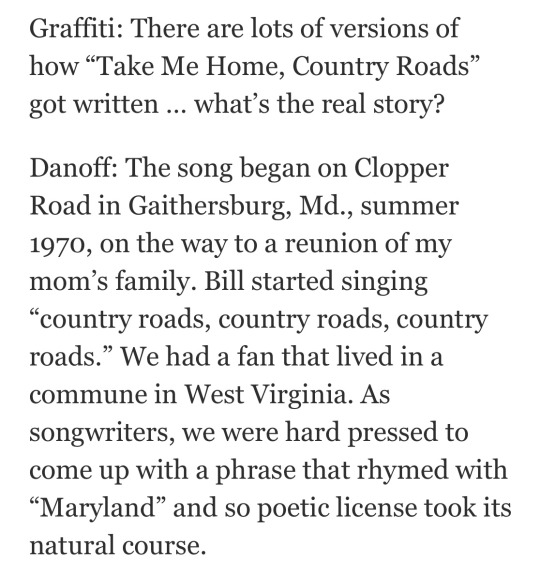
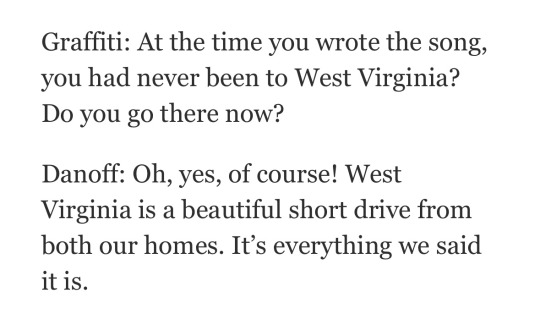
The other thing is, it wasn’t written by John Denver but by a couple, Bill Danoff and Taffy Nivert. Their creativity and collaboration brought the song to life before Denver’s voice made it a legend.
Before the success of that song, the two were very much starving artists—in the most literal sense. They couldn’t even afford groceries.
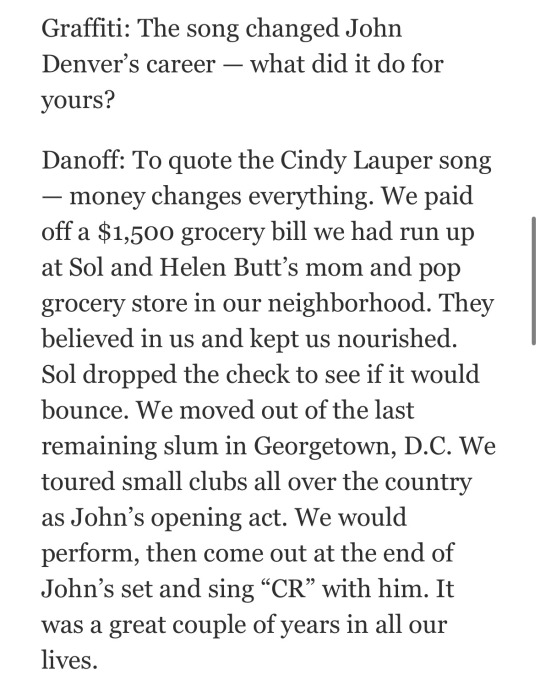
The names Sol and Helen Butt may not mean anything to you, but they mean everything to me…they were my great-grandparents.
Sol was a Polish immigrant, hence the unfortunate last name, awkwardly shortened from its original Polish form. It’s difficult to trace the records, but we believe he arrived in the U.S. sometime in the late 1920s or early 1930s. According to my grandmother—his daughter-in-law—he saw the writing on the wall with the rise of fascism and antisemitism in the lead up to you know what.
As a Jew, he decided to leave before it was too late. The details are hazy, and my recently deceased grandmother’s memory wasn’t as sharp in her final years. (We sadly lost my grandfather when I was very young.) But as far as we know, only Sol—and possibly one of his sisters—made it out. What became of his parents and other siblings is unclear, but you can imagine…
Sol was, by all accounts, a kind, generous, and very… passionate man. One family legend tells of a time when a man came into their little “Mom and Pop grocery store” and held a knife to my great-grandmother’s throat, attempting to rob them. My great-grandfather was in the back, where they also had a small butcher shop. Hearing the commotion, he came out holding his giant butcher’s cleaver. The would-be robber took one look at the furious Polish man with the enormous knife and bolted. But Sol, enraged that someone would dare threaten his beloved wife, didn’t stop there—he chased the man down the street, cleaver in hand, yelling at him the whole way.
Sol and Helen had a long, happy marriage until their deaths, long before I was born. They were apparently so well-loved in their neighborhood that when they eventually retired and sold their shop, the community threw a giant block party in their honor. Somewhere, packed away in my dad’s house, there’s an old album with grainy photos of that day—a celebration of two lives that left such a lasting mark on everyone around them.
They were survived by my grandfather, who, as I mentioned earlier, passed away many years ago. Even so, I can still vaguely remember him—a warm, bald man with an infectious belly laugh and the kind of hugs that made you feel completely safe and loved. Sol and Helen raised a good man, someone who spent the last 30 years of his life using his law degree not to climb the ladder at some fancy law firm, but to defend people against predatory IRS practices, fighting for those who couldn’t fight for themselves. Tragically, despite his dedication to helping others, he was let down by the U.S. healthcare system and died from a preventable cause—a painful irony for a man who spent his life trying to make things fairer for others.
All this to say, immigrants built this country, shaping everything from agriculture to art and contributing to the few parts of the U.S. that make life here worth living. No one should have to justify why they deserve to exist somewhere, but immigrants have more than proven their value. Without them, much of what we think of as quintessentially American wouldn’t exist—from Italians giving us pizza to Japanese workers building the railroads, to Mexican communities enriching our culture, to a small immigrant-owned grocery store quietly supporting the creation of one of America’s most beloved songs. Immigrants aren’t just part of the story—they are the story, woven into the very fabric of this nation.
Fuck Elon Musk
Fuck our orange dictator
Fuck Nazis
And remember kids, always punch Nazis in their stupid fucking face.
Or chase them with a cleaver, you have options.
Thank you for coming to my TED talk, that is all.
#immigrants#country road#john denver#maryland#Billy Danoff#Taffy Nivert#Family anecdotes#Fuck Nazis#Punch Nazis in their stupid fucking faces#fuck elon musk#Probably going to get some kind of community guideline violation#but I don’t care#I had to say this#People’s existence shouldn’t be political#while I’m at it#trans people are people#idk how to tag this#donald trump#fuck trump#elon musk#fuck musk#us politics#fuck maga#rip our democracy#immigration#current events#anti facist#pro immigration#american politics#the american dream is dead
7 notes
·
View notes
Note
hiiii !!! you’re like my favourite writer ever. the whole reason i got into the marauders is because of my love for art and finding art heist baby 🙈
i live in aus and i’m turning 17 soon. i want to do a degree in art history but im scared it wont get me anywhere? what do you think??
hi!!! thank you so much, this is so sweet!!! <3
well, as someone with 2 degrees in art history i am afraid i will be a bit biased here but i say absolutely do it if it's something that you love and are passionate about!
being completely candid here i had the best time in school. the BEST time. i loved every second of what i was doing and learning and it never felt like a chore. then for about 5 months post-grad i wanted to find a very large hole and bury myself in it because i could not get a job that utilized my degree to save my life. they were either extremely low paying (seriously, no person could live off of that wage and they were also PhD preferred) or entry level jobs calling for 5+ years experience ???? Like. GET. REAL. (not to worry tho i just recently got a job (aye) as an exhibitions and collections specialist at a museum so we are so on the up and up again)
also being candid here. you're never going to make a ton of money in this field. you're not gonna be "rich" and 95% of it is who you know. the art world is small. TRUST. also, most positions in an art historical field require at least a master's degree tbh. a lot would prefer a PhD especially if you're looking to do curatorial work in any time period pre 1920s. (so if you're an impressionist/baroque/renaissance kinda person be prepared to get a PhD and be prepared to learn another language aside from english to get a good job in the field) <- i do find that it's easier if you're more modern and contemporary focused to get on with just a masters degree
that being said, if this is what you want to do. if this is what you love. it is never a waste and you will find a way. (if I can find a way anyone can find a way). my best advice is talk to your professors, do internships, work if you can !!!! volunteer at your art museums!!!! meet and talk to the museum professionals in your area and NETWORK!! (I can't stress enough how many times someone has been like "oh you worked [redacted] did you know [redacted]?'" and i could be like "yes!!! i worked under them for two years loved her!! blah blah blah" it goes a long. way. i've had professors send me gallery writing guides and artist biography guides from when they worked at the MET so i would know how to write them, academic advisors in scotland know my art history professors in undergrad and subsequently became my bestie by extension, curators at a museum i volunteered at teach me how to work archival systems when they had a free minute)
talk to as many people as you can!! network!!! get some experience in archival systems, instillation work, art historical research!! work with your local university's/city's museum or archeological center! that way, when you're on your inevitable 239823 interview post-grad, someone at some gallery will be like "oh you worked here? under so-and-so???? you're hired"
i love it. what i do doesn't ever feel like work to me, it's exciting and fun and enjoyable and not something i do so i can do other things. it's not something i do just to make money. it's hard. post-grad is hard. but it's hard for a lot of people rn, not just art historians. i'm always gonna say go for it!!!! it is never a waste to do something you love!!
26 notes
·
View notes
Text
Mental health diagnoses are capitalist constructs
“Mental and physical diagnoses aren’t objective facts that exist in nature, even though we usually think of them this way. While the experiences and phenomena that fall under different diagnostic categories are, of course, real, the way that we choose to categorise them is often influenced by systems of power. The difference between ‘health’ and ‘illness’, ‘order’ and ‘disorder’ is shaped by which kinds of bodies and minds are conducive to capitalism and the state. For example, the difference between ‘ordinary distress’ and ‘mental illness’ is often defined by its impact on your ability to work. The recent edition of the DSM, psychiatry’s comprehensive manual of ‘mental disorders’, mentions work almost 400 times – work is the central metric for diagnosis.
“When we look across history, it becomes even more obvious that diagnosis is tied to capitalist metrics of productivity: certain categories of illness have come in and out of existence as the conditions of production have changed. In the 19th century, the physician Samuel A. Cartwright proposed the diagnosis of ‘drapetomania’, which would describe enslaved Black people who fled from plantations. While we might think of drapetomania as a historical outlier among ‘true’ and ‘objective’ diagnoses, it is underpinned by the same logic as other diagnoses: it describes mental or physical attributes that make us less exploitable and profitable. In the 1920s, medical and psychological researchers became interested in a pathology called ‘accident-proneness’, which was applied to workers who were repeatedly injured in the brutal and dangerous factory conditions of the industrial revolution. Dyslexia, a diagnosis I have been given, also didn’t emerge until the market began to shift from manual labour towards jobs that relied on reading and writing, when all children were expected to be literate. Despite having problems with reading, I understand that in a world where reading and writing weren’t so central to our daily life, there would be no need to name my dyslexia, no need to diagnose it.
“As a system of state power, many of us rely on diagnosis to get the material things that we need to survive in the world. When illness or disability interferes with our ability to work, we often need a diagnosis to justify our lack of productivity – and for some, diagnosis is the necessary pathway to getting state benefits. If we want to get access to medication, treatment or other healing practices provided by the state, diagnosis is also the token that we need to get there. This is made all the more complicated by the fact that doctors have the power to dispense and withhold diagnoses, regardless of our personal desires. When it comes to psychiatric diagnosis, most of us know someone who has had to fight or wait for years for a diagnosis that would improve their quality of life – particularly in the realm of autism, ADHD and eating disorders. The internalised racism, sexism, classism or ableism of doctors often gets in the way of our ability to access the diagnoses that we want and need. Then there are those of us that are given diagnoses that we reject, a process that we also have no say in ...
“When we understand that psychiatric diagnoses are constructed, contested, and aren’t grounded in biological measures, the idea of ‘self-diagnosis’ starts to feel less dangerous or controversial. Self-diagnosis is grounded in the idea that, while the institution of medicine may hold useful technologies and expertise, we also hold valuable knowledge about our bodies and minds. I know many people who have found solace and respite in communities for various diagnoses, even if they don’t have an official diagnosis from a doctor. These spaces, which respect the wisdom offered by lived experience, can be valuable forums of knowledge-sharing and solidarity. Self-diagnosis also pushes against an oppressive diagnostic system that is so centred around notions of productivity.”
#anti-psychiatry#psychiatry#psychology#mental health#mental illness#mental disorders#diagnosis#mental healthcare#healthcare#neurodivergence#drapetomania#dyslexia#autism#adhd#benefits#disability#capitalism
85 notes
·
View notes
Text
It's been a hard week for a lot of folks, maybe most folks, so I thought it might be a good idea to write a bit about some things I am enjoying at the moment.
I'm listening to Report for Murder by Val McDermid. It's my first time with this author and so far it's fun. I'm still fairly early in the story (the murder was just committed), but the voice actor, Caroline Guthrie, is particularly good with accents which helps make it feel a little more like an audio drama than an audiobook.
I'm also reading Night's Master by Tanith Lee and am enjoying it as my before-bed book. This is one I'd suggest reading in print (or e-book) rather than as an audiobook if you can manage it. Tanith Lee's writing can be heavy on metaphors, very lyrical and perhaps a bit florid. I've needed to see the words on the page (as well as the punctuation) to make sure I understand everything she's implying. It's also my first time reading anything by this author.
I recently finished The Poisoned Chocolates Case by Anthony Berkeley and I think it's worth checking out if you like Golden Age mysteries. The writing didn't always grip me and I came into the book via someone telling me how funny it was, which...a lot of the humor is very dry and "of its time" which gives a great feel for what folks' senses of humor were like when it was published in 1920s England but didn't always work for me. It's a very interesting premise, however.
I also just finished Shakespeare: The Man Who Pays the Rent by Judi Dench and Brendan O'Hea. I had so much fun listening to this one, and I think it's a book that works better as an audiobook since it's essentially a transcription of a series of conversations with the two writers. It's one part literary study of Shakespeare and the complexities of some of his female characters and one part autobiography of Judi Dench's life as a performer.
Newish songs that are on heavy rotation for me at the moment:
What it Feels Like - Aly & AJ
Paranoid - PUP
Stick Season - Noah Kahan
Dead Man Walking. - Mon Rovia
Funny Papers - Mac Miller
Care for You - ANOTR
NUEVAYol - Bad Bunny
Knockin' Heart - Hamilton Leithauser
Disco Nap (feat. Metronomy) - Polo & Pan
Focus (feat. CLOVES) - John Summit
Soundtrack tracks on heavy repeat currently:
This Road (The Mirror is a Trap) from Alan Wake 2 - Poe
Kay Vess, The Outlaw from Star Wars Outlaws - Wilbert Roget, II
The First Hunter from Bloodborne - Tsukasa Saitoh
The Poet and the Muse from Alan Wake - Old Gods of Asgard
Queen of Air and Darkness (feat Little Rocks Big Sound) from Star Wars Outlaws - Cody Matthew Johnson
The Whole World Was Ready to Return from Interview with the Vampire, Season 2 - Daniel Hart
Kyovashad from Diablo IV - Ryan Amon
Herald of Darkness (feat. Alan Wake & Mr. Door) from Alan Wake 2 - Old Gods of Asgard
Suite from Star Wars: Skeleton Crew - Mick Giacchino
There Is No Peace Without Tuba from Werewolf by Night - Michael Giacchino
4 notes
·
View notes
Text
Writeblr Introduction

Hello! It's time to properly introduce myself to the writeblr community. You can call me KC if you want. I am a full time specialist as my local library system and I have a Master of Letters in Fantasy Literature from the University of Glasgow. For now, this is my writing website, until an agent/editor tells me to build a WordPress or something. (I honestly hate traditional blogs. Weird quirk, don't know why. Also, links are underlined). If I get tagged in things, I will do my best to respond to them and share it forward.
Published Works- This includes my self-published 5e adventure and the two anthologies that include my stories. It will be updated and kept current as this develops.
Works in Progress- The main projects that I've been bouncing back and forth between. Most are world-oriented, meaning they have numerous interconnected stories within a single world.
Where to Find Me: Some of my other internet homes, including World Anvil, Pinterest, Twitter, and Facebook.
More Details Below...
Here are some more details on the different things I linked above:
Published Works
"Sofia Serrento's Flying Circus and the Sky Pirates of Shanghai" is published in the anthology Hell Hath No Fury: New Pulp Heroines. It's a New Pulp story set in 1930s Shanghai, featuring Sofia Serrento and her all-women aero-circus/spy ring.
"The God-Kings' Tomb" is published in the anthology Futures That Never Were, an anthology of original sword & planet short stories. This one is in the same universe as Sofia Serrento, so the two stories are... technically connected. This one involves an SOE advisor specializing in the occult and arcane who finds herself transported to a different planet in the solar system.
Siege at Oasis Butte is a standalone 5e adventure published through the DM's Guild featuring a desert town under siege by mercenaries with mysterious motivations.
Works In Progress
Iron Horizons/The Pilgrim's War: This was a NaNoWriMo novel from a few years ago that has since... grown. I've been calling it a Dieselpunk space opera, but alternate history/retrofuturism is also apt. Basically, humanity rapidly developed space flight in the 1920s based on some MacGuffin physics nonsense leading to the second world war happening on a solar system level using extensions of 30s aesthetics. Pilgrim's War is set roughly 400 years after that war ended, with the extensive resources from space maintaining the colonialist expansion into the stars and focuses primarily on a sort of... War of 1812 situation between a well-established independent government and their recently independent colonies.
The Centurion Club: My published short stories are set in this universe. Ironically, this is also an alternate history. It's the primary setting for my "New Pulp" fiction. It's mostly short fiction, with some longer projects in the brainstorming phase, and it focuses on the fictionalized city of Weymouth in New England and the members of the illustrious Centurion Club, a scientific society for explorers, scientists, freedom fighters, reformers, and others who push the boundaries of human society. Beyond that, a sword and sorcery setting in Mesolithic Doggerland, some privateers/mercenaries in the 17th/18th centuries, and a contemporary CGIS special agent in a Clive Cussler vein, plus a great many vigilantes and adventurers in the 1930s.
Sigil of the Sea King: A heroic fantasy which, also a NaNoWriMo project, is self-indulgence, where I throw together everything I've really enjoyed but could never fit in elsewhere. So there's an island kingdom ruled by merchant sea princes, flying air whales, nomads whose wagons are pulled by sails, cozy Forest Folk, a lone surviving heir to a crumbled kingdom, and lots of influence from Georgian/Armenian/Caucasian culture, mythology, and history.
Flintlock Fantasy: This is just the earliest stages of development, mostly just simmering, but somewhat Napoleonic secondary fantasy world. The main character is an elf named Lark, and I think she's sort of a janissary-type sent to work covertly in a border region between two empires. Random, Personal Information
You may have once known me as NovelistSpaceRanger, but that was like 8 years ago.
I'm a certified open-water diver and I'm working on my advanced open-water diver later this summer.
Also a whitewater rafter, backpacker, mediocre yogi, and rock climber.
I've been to 14 countries and spent a year and a half living in Europe.
#writeblr#kckramer#writing community#my writing#writeblr intro#short story#new pulp#writing blog#novelistspaceranger#dieselpunk
71 notes
·
View notes
Text
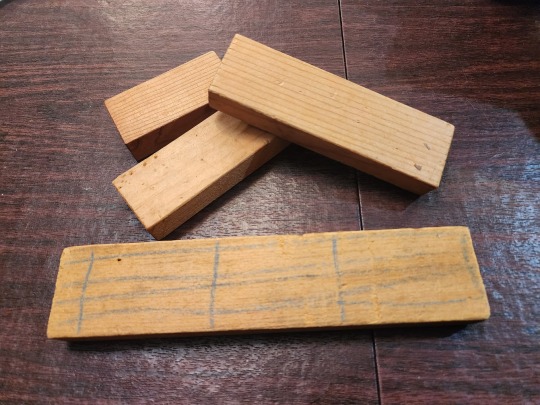
They say to write what you know...
Here's a little Easter Egg for my readers! (And also for history nerds! Or people who just like personal stories!)
There's a bit in CotFA about Nero creating makeshift building blocks for their foster kids by cutting up scrap lumber and letting the kids draw fences and brick patterns on them with crayons, because he can barely afford food for them and doesn't have money for toys.
The characters may be fictional, but the blocks are real. When I wrote the story, I was drawing on my own childhood memories, but recently I found a few of the blocks in a box (pictured above) and thought I'd share their history.
First, you must understand that my family's generations are EXTREMELY spaced out, due to multiple generations having children very late in life. My own great-grandfather was alive while Abraham Lincoln was in office -- and 159 years later, his youngest daughter, my grandfather's sister, is still with us. (In fact, I saw her at a family birthday party just a few days ago.)
For me, the American Civil War (1861-65) was just three generations ago. My aunt grew up during the Great Depression (1929-39). This is relatively recent history, from a personal memory standpoint.
What this means is that my grandparents, born in the first decade of the 20th century, were married shortly after graduating high school in the mid-1920s. They were a young couple with a toddler (my aunt) when the Depression hit. Though my grandfather was fortunate enough to keep his job, money was still extremely short, and sometimes they ran out of food or other essentials before he got paid. That experience instilled in them a deep-rooted thriftiness, bordering on dogma, that has been passed down to my generation (nearly a century later, I am STILL comparing cans of beans at the grocery and buying the one that costs three cents less, even though at this point in my life I can afford the national brand).
For the rest of his life, my grandfather did not spend a single cent that he didn't absolutely have to, and he saved and reused things religiously. When a shirt wore out, he saved the buttons (I still have his button tin) and then repurposed the fabric as patches or cleaning rags. He recycled wood from packing crates into things like storage boxes and tool trays, some of which I'm still using in my house today. (See the end of this post for a gallery of some of his work!)
Much later in life, my grandparents had my mother. Born in the 1950s when Westerns dominated the American consciousness, she grew up playing with toy horses and wagons and farm sets, and was (*cough* still is) generally the OG horse-crazy girl. She did have some commercial toys, but her father also provided her with blocks made from scrap wood to use as farm fences and jumps for the horses, because why spend money on expensive toys when there's perfectly good wood in the garage?
Fast forward a few more decades: My sister and I inherited my mother's old farm toys and added many of our own. We were used to having assorted old, reused and recycled things around, because that was just the family culture -- you don't throw things away if they can be repaired or reused, and you don't spend money on something if you can find a way to fill its function without spending money. (Today's consumers could learn a lot from my grandfather, I think.)
So, using several decades' worth of toy fences and fence substitutes, my sister and I built massive horse farms and show jumping rings on the living room floor for our toy horses to inhabit. We were very precise with our building, and different kinds of fencing (wooden blocks vs. molded plastic fences from a farm set vs. Lincoln Logs, for example) meant different things -- for example, the gates had to be a different kind of fencing than the fence proper so you knew which part could open to let the horse walk through. Children are extremely serious about such things. It never occurred to five-year-old me that you could make a play farm out of just one kind of fencing. Why else would we have all these different materials to build with?
The blocks pictured above were almost certainly used as toy horse fencing. The piece with the fence pattern drawn on it is actually decorated on both sides, one in a more controlled hand than the other. I think my sister (four years older than me) must have drawn a fence on one side, and I attempted to do the same on the other, but from the looks of things I hadn't quite earned my Fine Arts degree yet.
Gallery
My grandfather had a very white-collar day job, but he was also a skilled craftsman and artist -- and he labeled everything, often humorously. Here are a few of the items sitting around my house that he made.
A wooden lap desk with hinged lid for storage and a silly label (surname obscured):


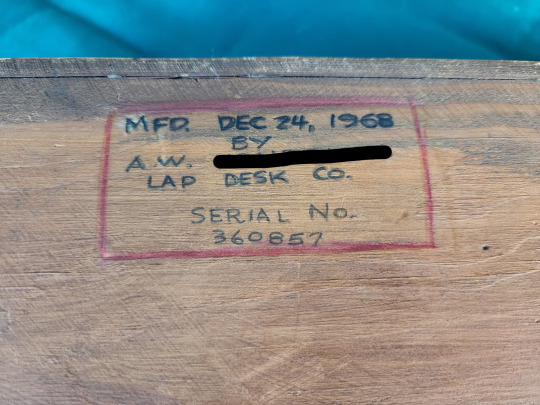
A drafting board, complete with homemade triangle and T-square, both of which have their own storage slots on the back! I have used this as a drawing board, and honestly this T-square is better than some of the commercial ones I have. (The wood surface has aged poorly because it was stored in suboptimal conditions for a long time, which is unfortunate, as I love the size and convenience of this thing. I can still use it if I put a stiff plastic sheet under the paper, though.)
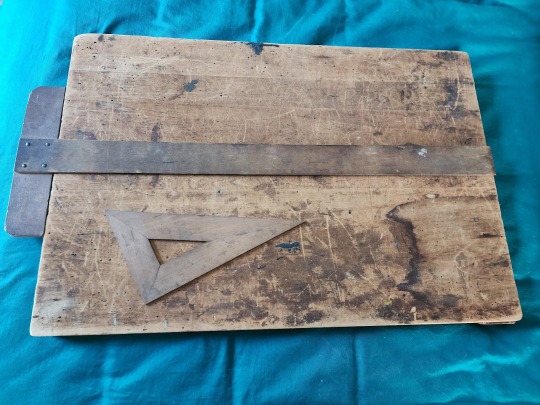

A silverware divider tray (which, oddly enough, is the ONLY one that fits my narrow kitchen drawers! I tried at least three "small" commercial models with no luck, and was thrilled when this one turned up in family storage)
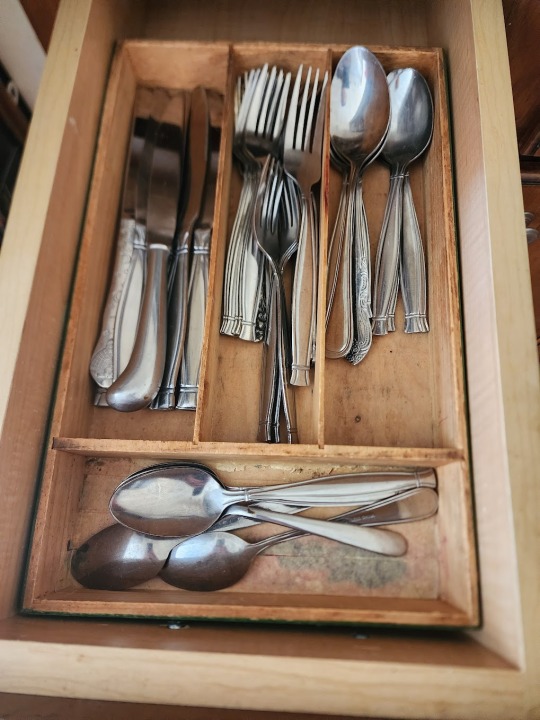
A labeled (like everything) tool tray from his garage shelves, which I'm now using in my kitchen

A neat old food shipping crate that he dismantled and turned into a large storage box, which now holds my records
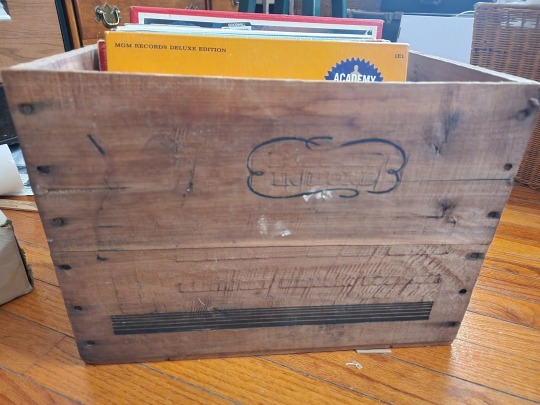
4 notes
·
View notes
Note
Hi! I adored your poem so much that I got excited and had lots of thoughts about your lovely writing. So one thing led to another, I wrote some notes, and I thought it might be a fun experience to share my thoughts with you. So here are my notes on Sharing a Cigarette with Joan of Arc. This isn’t nearly everything that there is to say about this piece, I just wanted to gush about my favorite aspects of my initial reading (which may or may not have happened when I was drunk, I will admit).
(Also, sorry if it’s a bit confusing, there are lots of grammatical mistakes and lacks structure. I mostly wrote/adapted this on my phone this morning while commuting and English isn’t my native language. I’m so sorry if I’m not quoting you right too, I’m mostly doing this from the top of my head)
As a queer person myself, I am very familiar with feeling small & vulnerable, grasping at the straws to figure out who (what?) I am, stuck in limbo, which is probably why I love it so much that your barebone characters melt into one another, the mirroring and entanglement that lasts only for a moment but isn’t any less significant. I loved the metaphorical give-and-take between the reader and Joan (a conversation that never happened between past and present. A revelation of sorts? Euh, I can imagine that) echoing the banality of sharing a cigarette with a stranger at the bar (Joan borrows your lighter but she rolls your cigarette and you’re sharing the same experience). I loved the economy of words, the graceful dryness of the writing. There’s no need to say too much for us to see what we’ve been looking for; your poetry is a mirror (I don’t remember what was the first piece of you that I’ve read, but I thought it was cruel; demanding & merciless. I loved it).
I love the parallels between the scene and the content, the characters are standing in between spaces (religious & secular space, masculinity & femininity, freedom & constraint, etc…) both figuratively and literally (‘the emergency exit of a Parisian bar”). More generally; I love the back and forth between temporalities, the inside & outside, the person & the saint.
Ok, here’s something interesting; the figure of Joan of Arc is very ambivalent. She’s revered as a martyr and a Catholic saint (she was beatified in 1909 and then canonized in 1920 if I remember well, so that’s pretty recent, and an interesting political move) but she’s also considered a feminist icon, and a national symbol, so as far as historical figures go, she is associated with various movements and currents of thoughts. Joan is a figure of antithesis. During World War I, her image was used to fuel the French national sentiment, and during World War II, she was simultaneously a symbol of Pétain’s France of Vichy, a symbol of the Résistance under de Gaulle's leadership, and of the Communist resistance. This is kinda crazy when you think about it because nowadays she’s mostly associated with the monarchists, and more generally the French far-right (every year the RN celebrates JoA on the 8th of May. There’s a funny story to it). Her legacy is rich and contradictory, and it tells you exactly nothing about who she might have been; because she had no say in how her story was recorded, and the chronicles of her life were written by people who had lots of stake in how future generations would interpret her actions (& their inaction). We know nothing about who she was; “ I don’t want them to keep me. As a saint you lose all autonomy, your body is not yours to bury.” But that’s also what makes her so fascinating, right? I personally very much love the ambivalence of Joan's image; because to me as a French person, she’s deeply associated with a sense of identity (Joan’s sense of self is her divine right), but she’s also a symbol of individuality, transgression & defiance against social norms. That’s why I loved the ideological scope of your poem so much; a reinterpretation of the myth that reconciles every one of these facets. I love her for what she tells me about the loneliness of the struggle; the push to action; the jaded resilience and determination. (On a side note, did you know The Second Coming of Joan of Arc by Carolyn Gage or I, Joan by Charlie Josephine? I’m kinda betting that you do cuz you seem pretty well-read, but if that’s not the case, those might be interesting and right up your alley) “In poet’s tongues & in the tip of the artist’s fingers. In the sound, a young girl’s hair makes when it falls to on her shoulders, in the way a boy creates himself with a pair of kitchen scissors & his parent’s dismissal. Patron saint of non-conformists, angel of the oversized sweater, of the buzzcut & the transsexual.” Those are my favorite lines, you have no idea how much i'd wanted to hear that.
I love the use of religious imagery in this context; the run-on pattern of light and fire that is so pervasive within the Christian mythology that’s associated here with the cigarette, which simultaneously joins the images of fire, smoke, and ashes, and defines the temporality of the piece as well; that transient moment of sharing a cigarette & chatting with a stranger at a bar (watching a small fox chasing a butterfly). Of course, Jeanne was burned at the stake so the association with fire is pretty commonplace, but what I love most is how you’ve capitalized on so many aspects of the symbolism of light and fire at once, be if within the Christian mythology and some sort of collective imaginary driven but many other influences, a rich network of associations feeding into one another. For instance, fire is often used as a symbol of God's presence in Christianity (‘ to be touched by God is to be destined to early fire’). In the New Testament, Jesus is the one who brings fire to the earth, and the Holy Spirit is the "tongues of flame" (in this case, I love the idea that there are so many readings available to your poems because your art is also a revelation, this is also your language, ‘in poet’s tongues & in the tip of the artist’s fingers’) In Joans’s hands, the cigarette becomes an object of worship, much like in Christianity, the worship of fire was preserved through ritual candles (‘omens of a future in which her name is constantly lit by candlelight’). Religion and sanctity are simultaneously the conditions that make transcendence possible and the reason why Joan’s freedom is constrained. Fragile and illusory (the angel is parallel with a bird, a butterfly chased by a small fox. Which almost feels like a warning. Being seen is a point of no return. Doesn’t mean it’s not worth it). More generally (I’m thinking of Bachelard’s book, The Psychoanalysis of Fire, but I’m pretty sure any dictionary of symbols might say the same), and maybe more crucially, fire is associated with change, passion, or inspiration. Fire is the element of conversion in alchemy because everything that touches fire is irreversibly transformed, and often changed beyond recognition. But I kinda imagine that it’s not so much that fire has the ability to change something but instead fire reveals the underlying form of an element. Something that was there all along, a potential. As an element, fire has also mixed symbolism because it represents vitality and destruction, life and death, the lights of heaven and the pits of hell, a force that can be helpful when controlled (a candle, the cigarette), but volatile if left unchecked (the early fire; the pyre).
Association between the reader (you) and Joan, threading both into the same thoughts and experiences, creating a sense of belonging and understanding. I love the reference to physical transformation as liberating and cementing your sense of self and identity. Also, the repeating sequences about the hair reminded me of Patti Smith’s poem, “jeanne d’arc” which is also a subversion of the myth though she’s exploring a different alley. I love these lines, “got no hair / weighing me / cut so close / scalp is nicked”. I never knew it was such a universal experience, cutting your hair real short for the first time. I used to be so scared.
I love the choppy rhythm of your prose, the use of asyndeton that was kinda taken to the extreme, with the short sentences, you often dropping the subject clause, speech melting into thoughts into memories. There’s something organic about this that’s not quite like the usual stream of consciousness. Your poetry is like being out of breath.
Moreover, the dynamics of the passing of time are really neat in that piece, because you get the feeling that time stops, and freely moves backward (recollections; but also Joan’s presence - a sweet apparition) and forward (anticipation, and our knowledge of history, the cost of transgressing social norms throughout the past centuries. How far we’ve gone and how far we still have to go), which allows the reader to connect the dots on their own and retrace the underlying stories that transpire between the lines (Joan’s past, her fears, and doubts, her aspirations, etc… everything that makes Joan her own person before she is a Saint dispossessed of herself), gradually revealed in a smooth mix of inner dialogues, more distant thoughts & flashbacks, every aspect of the events connected to the characters and their journey. How brilliant.
On a side note, I am often reminded of Angels in America reading your poetry, mostly because you’re very similar in how you’re queering religious spaces (that is using religious motifs to express ideals, devotion, while simultaneously criticizing religious institutions & the dangerous hypocrisy of their tenants). You’re more radical tho, and I love your writing for that.
Alright, I'm done rambling. Good evening & take care!
THIS IS SO FUCKING COOL IM GOING TO CRY i loved Loved LOVED reading your thoughts about my poetry im always stunned when people take the time to analyze something ive written. sometimes you guys figure out things i didnt even know i was doing!! its such a cool way to discover things about myself + my writing. ill admit that sharing a cigarette is not the best thing ive written but seeing how it resonates w people fills my heart with joy. also i cant believe youre comparing my work to aia that play was extremely formative for me ive read it three times i think!! thank you sososososososo much!!!
35 notes
·
View notes
Text
I've decided this is going to be a tradition now so here's
My favorite books I read in 2023
(in no particular order)
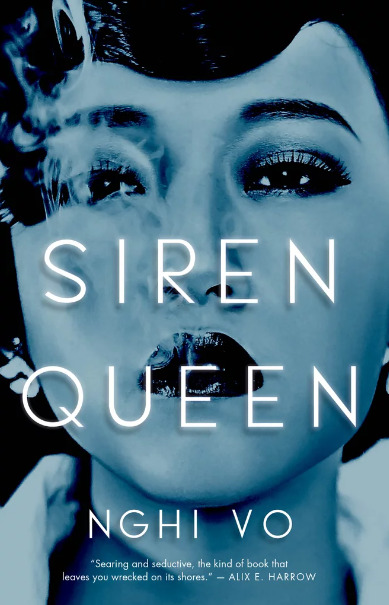
"Siren Queen" by Nghi Vo
this book is so fucking cool. I said this list is in no particular order but this is without a doubt my favorite book I read this year. This book takes place in a fantasy version of Hollywood in roughly the 1920s-1940s. It has everything: deals with shady nonhuman creatures, fantasy violence, old Hollywood glamour, lesbians. What else do you need? Genuinely the most unique worldbuilding for a fantasy story I've ever seen. Please, if you only take one recommendation from me ever, take this one. The audiobook SLAPS also.

"The Empress of Salt and Fortune" by Nghi Vo
Shoutout to Nghi Vo because I genuinely didn't even realize both of these books were by the same author. Queen. Anyways. So you know how the movie Titanic is told through the lens of people hearing the story from Rose as an old woman? Similar set up but also not similar at all. A sort of nun/monk person on a mission of historical and anthropological chronicling comes to the long abandoned residence where a recently deceased empress once lived in exile. There, they meet the empress' personal maid. As the main character (I can't remember the name off the top of my head, sorry) goes through and archives artifacts from the home, they get to hear stories of the empress' early life in their kingdom as well as her time in exile leading up to her rise to power. I'm not selling this well but it's REALLY good and a very quick read.
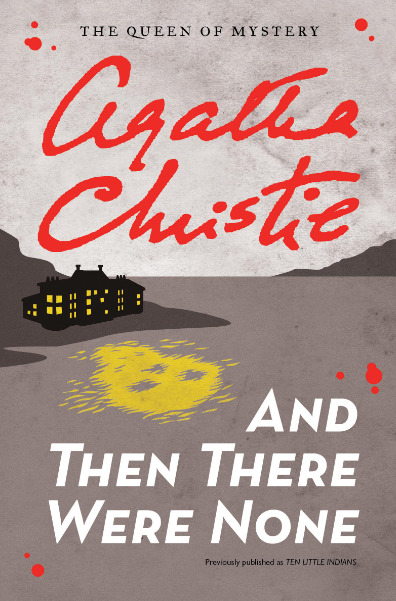
"And Then There Were None" by Agatha Christie
She's the queen of mystery for a fucking reason!!! This was apparently the year of Nghi Vo and Agatha Christie because Queen Agatha was the other author that just dominated my reading list. Anyways, the set up of this is that 10 people are lured to a mansion on a remote island and start getting killed off. I had a lot of fun trying to figure out who among them was The Killer (even though I ultimately failed to get it right).
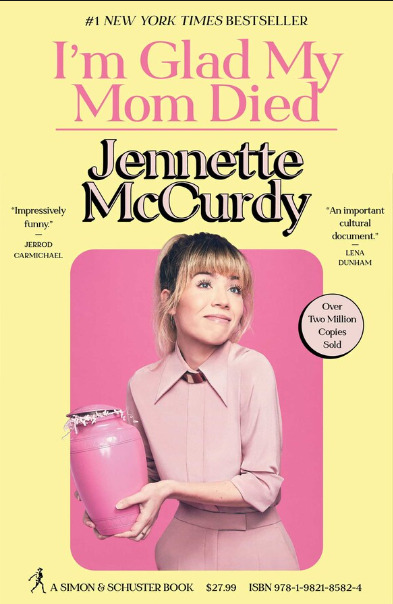
"I'm Glad My Mom Died" by Jennette McCurdy
Look. Reading and loving this book in the year 2023 is not a unique experience. This book is a tough read in that a lot of really terrible things have happened to her, but I (like everyone else who's read it) need to give her a lot of props for her skill, frankness, and humor about writing this book, as well as just her strength for getting through all that. Go Jennette!
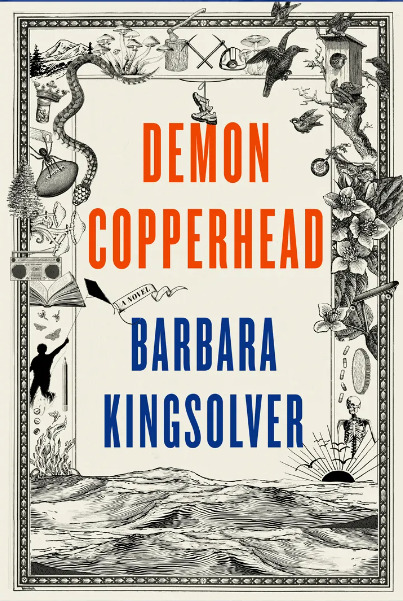
"Demon Copperhead" by Barbara Kingsolver
Reading and loving Demon Copperhead in 2023 is ALSO not a unique experience. It won awards for a reason. But I liked it so it goes on the list This is a modern take on David Copperfield that follows a boy from the Appalachians as he grows up in the foster system (and through the opioid crisis). I know that sounds bleak, but he's a character that you really wanna follow and root for, even at his lowest. It's a LONG book, but well worth every page in my opinion.
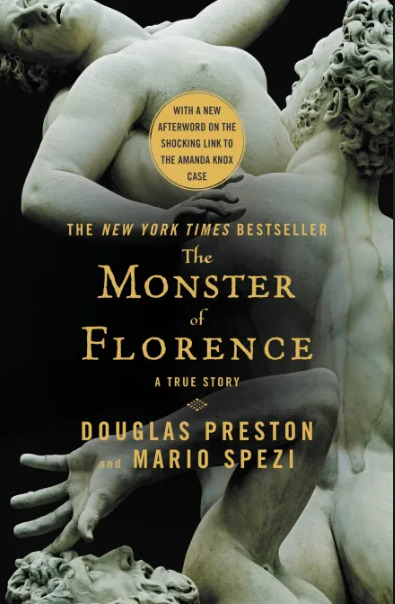
"The Monster of Florence" by Douglas Preston and Mario Spezi
One of the authors got kicked out of Italy for writing this book! Doesn't that already catch your interest???
Anyways, this is a nonfiction book. Half of it chronicles the twists and turns in the investigation of the still-unsolved Monster of Florence serial killer case (which is. Horrifying. To give fair warning). But it also delves into the corruption and mismanagement of the Florence police department, culminating in a frame job intended to make the authors keep their mouths shut about this case. It's definitely a creepy case, so if you don't have much of a stomach for true crime I'd skip this one, but I could not put this book down (figuratively - I listened to the audiobook, lol). I went on runs solely so that I would have more time to listen to it some days.
That concludes this list of 2023 book recommendations. Hope y'all enjoyed! See you again this time next year.
9 notes
·
View notes